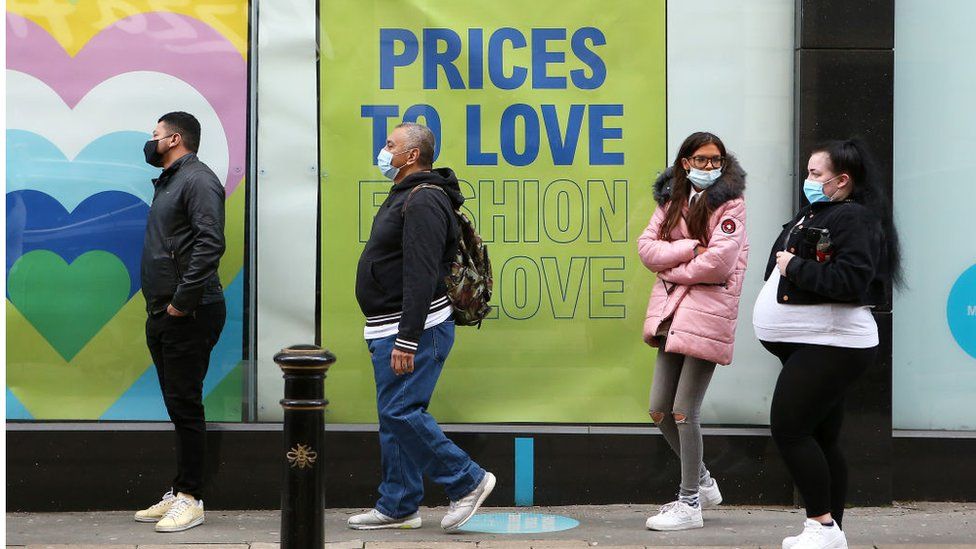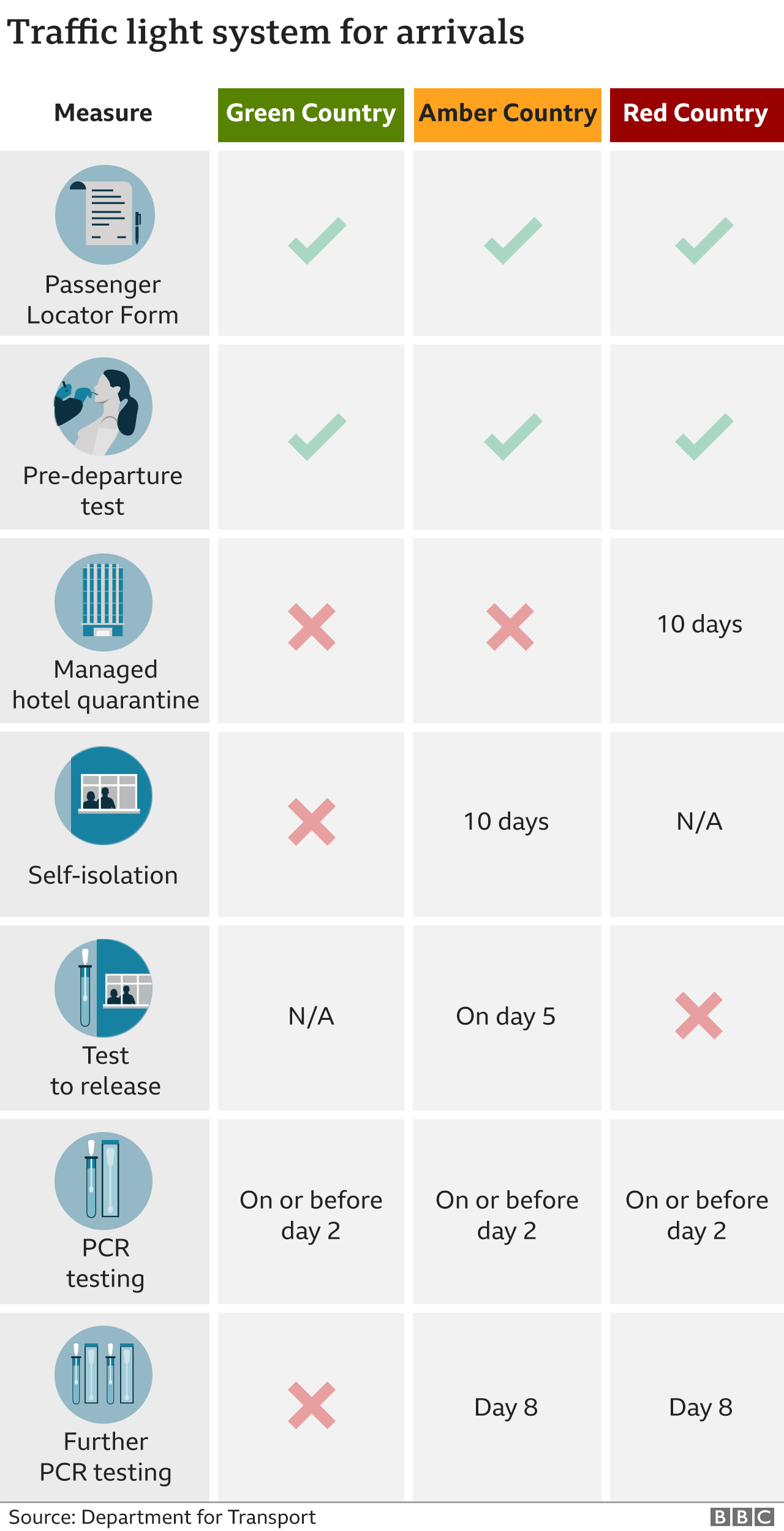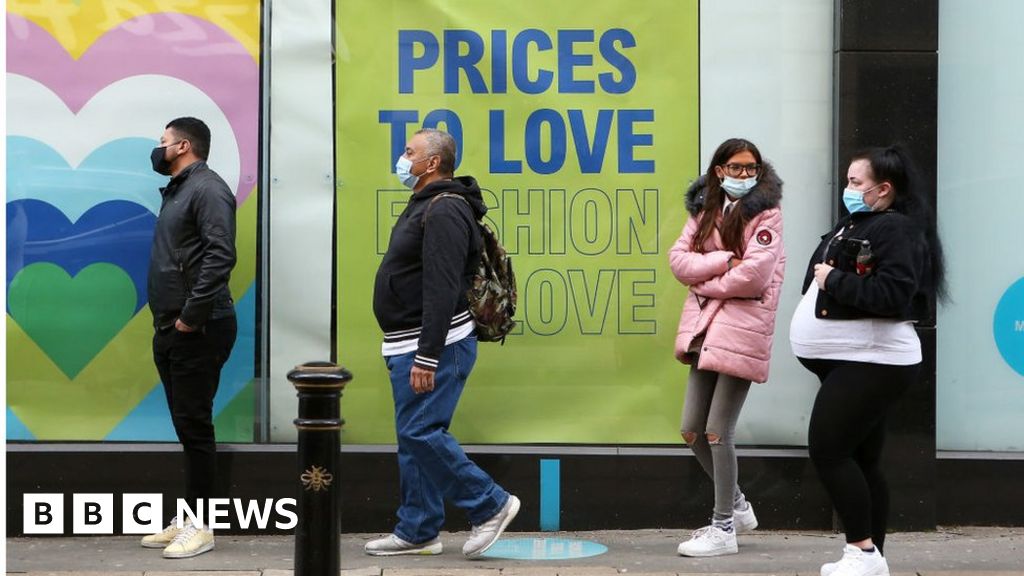
There is a “good chance” the 1m plus social distancing rule can be scrapped on 21 June in England, the prime minister has said.
Boris Johnson said the results of the vaccine rollout are “really starting to show up in the epidemiology” – but any change would depend on the data.
Labour leader Sir Keir Starmer agreed that caution was necessary.
Mr Johnson also suggested there could be some “opening up” of foreign travel on 17 May.
During a campaign visit to Hartlepool the prime minister said ministers would say more about travel “as soon as we can” but “we have got to be very, very tough”.
He said that “the way things are going” with the vaccine rollout, the 1m plus rule – which allows people to be 1m apart if they take extra precautions such as wearing face coverings – could end when England reaches the final step of its roadmap out of lockdown.
Mr Johnson said 50 million doses of coronavirus vaccine have been administered. That includes more than 34 million people who have had a first dose and more than 15 million who have had a second, according to the latest government figures.
He said he felt as though the next stage of reopening on 17 May – which covers indoor hospitality, entertainment and possibly foreign travel – would “be good”.
“I think we have got a good chance of being able to dispense with the 1m plus from 21 June,” he added.
“That is still dependent on the data, we can’t say it categorically yet. We have got to look at the epidemiology as we progress, we have got to look at where we get to with the disease. But that’s what it feels like to me right now.”
Labour leader Sir Keir Starmer said any easing of social distancing measures would have to be “cautious and careful”.
“All of us want to see the restrictions eased but also want to make sure we don’t go into another lockdown,” he said.
“I will listen to what scientists say – there are a number of weeks to run until 21 June. I hope we get to situation we can ease restrictions but have got to be led by science.”


Are we are on the brink of beating the virus? Talk of foreign travel and the end of social distancing raises the very real prospect we are.
It would be foolish to say, categorically, this is it.
Even with the continued successful rollout of the vaccination programme, there is still scope for the virus to spread, given the jabs are not 100% perfect and not everyone will get vaccinated.
Variants could also still cause problems – although there is plenty of evidence to suggest these will be more limited than sometimes seems to be the case. Experts remain confident that even if the mutations help the virus dodge some of the immune response from the vaccines, the jabs will still be very effective at preventing serious illness.
So while the virus is not going away (cases are certainly going to rise again) the risk it poses has been dramatically reduced.
And that means our response to it can be, too, so some of the non-Covid harms of the past year can really start to be tackled.

In Scotland, the government timetable for lifting Covid restrictions suggests physical distancing will be in place beyond “Level 0” – the lowest level of curbs – currently expected from late June.
In Wales, where “alert level 3” restrictions are in place, even its lowest alert level 1 suggests people should still observe “social distancing rules with people you do not live with or who are not in your exclusive extended household”.
The Northern Ireland Executive has described social distancing as part of the “personal responsibility to protect ourselves and others” that could be required “for some time”.
The British Beer and Pub Association said the prime minister’s comments offered the sector “hope of a return to normality and viability”.
Chief executive Emma McClarkin said: “Given pubs are financially unviable under the current restrictions they face, being able to reopen without any restrictions at all from 21 June is going to be vital to their survival.”
She added: “Our recovery only begins when the restrictions are removed.”
Speaking before Mr Johnson’s comments, Kate Nicholls, chief executive of trade body UKHospitality, said recommencing unrestricted trading on 21 June would be “critical” and would allow companies to “come off life support”.
“We urge the government to confirm reopening dates and these plans at the earliest opportunity, which will boost confidence and allow companies to step up planning and bring staff back,” she said.

- LOOK-UP TOOL: How many cases in your area?
- YOUR QUESTIONS: We answer your queries
- GLOBAL SPREAD: How many worldwide cases are there?
- THE R NUMBER: What it means and why it matters
- VACCINE: When will I get the jab?

Asked about international travel, Mr Johnson said experts were assessing which countries were safe.
“We do want to do some opening up on 17 May, but I don’t think the people of this country want to see an influx of disease from anywhere else,” he said.
“I certainly don’t and we have got to be very, very tough and have got to be as cautious as we can whilst we continue to open up.”
Mr Johnson’s comments came after a group of MPs called on the government to keep travel rules in England in place beyond mid-May.
Foreign holidays are currently banned, but a traffic light system of rules will be introduced with countries classed as green, amber or red.
Travellers to green countries will not need to isolate on their return, but they will need to take a Covid test.
Arrivals from amber countries will need to quarantine, while red-list countries have the strictest rules, with only UK or Irish nationals allowed to return and they must pay to stay in a government quarantine hotel.
Further details are expected this week, after the government said it will “set out by early May” how countries will be categorised.

Many in the travel industry are hopeful for holidays this summer, while countries such as Spain, France, Greece, Portugal and Cyprus are preparing to open to tourists.
The European Commission has also recommended opening up to travellers who have received both doses of the vaccine.
The boss of Thomas Cook earlier told the BBC he expected many popular destinations, particularly in Europe, to be open to UK holidaymakers this summer as they were making “great progress”.
The first ministers of Scotland and Wales have previously argued that 17 May would be too early for foreign holidays to resume, and no date has yet been set for rules to be relaxed. Northern Ireland’s executive has not said anything about when it expects to make an announcement.
But a representative from the travel industry in Scotland has said any plan needs to be agreed between the four nations.
“There’s no way it’s going to work [with] Scotland operating a different system to England when you can freely travel across the border and fly out of an English airport – and that’s exactly what will happen,” said Alan Glen, from the Scottish Passenger Agents Association.
The next stage of England’s lockdown easing is expected in a fortnight, on 17 May. As well as the possibility of international travel, people will be able to meet in groups of up to 30 outdoors, while six people or two households can meet indoors.


